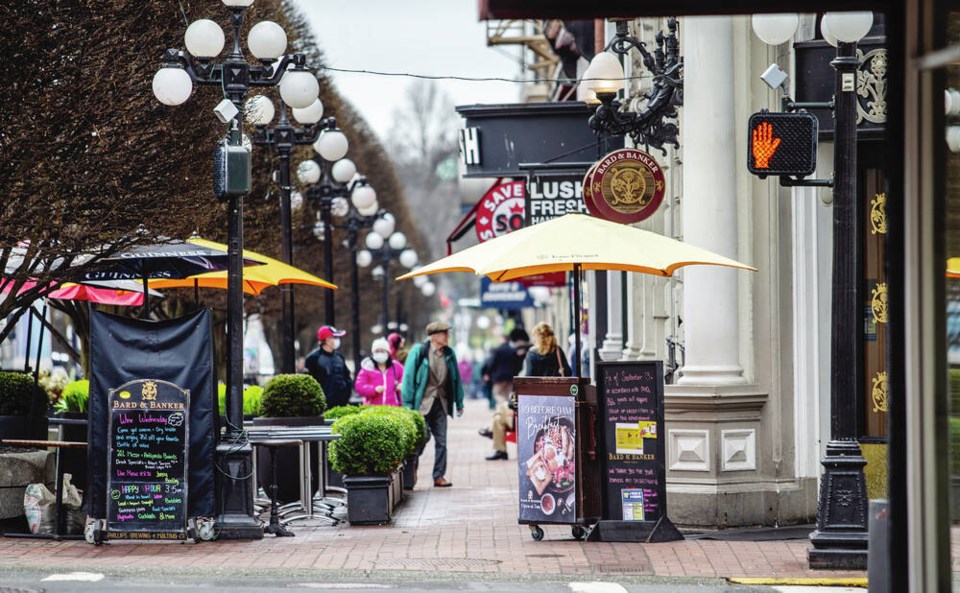My brilliant idea for solving the labour shortage: No more Sunday shopping.
You’re welcome. I shall accept your adulation modestly.
We take for granted which type of workplaces are open when. Certain ones — government operations, schools, banks and all those offices that fill commercial buildings from the second storey up — close each weekend, as dark and lifeless as Oak Bay after Jeopardy. The retail stores on the ground floor, by contrast, are mostly open seven days a week.
We forget that it wasn’t always thus. Sundays and holidays used to be off limits in B.C. by law.
It wasn’t until 1980 that then-premier Bill Bennett eased the ban by saying Sunday shopping would be allowed in municipalities where residents voted to approve it.
Of course, here in Dysfunction-by-the-Sea, where our myriad municipalities couldn’t co-ordinate a three-car funeral without driving off in four directions and losing the stiff, this led to a patchwork of regulations. While residents of Esquimalt, Sidney and the then-unincorporated communities of the West Shore approved Sunday shopping in 1980, those in Saanich rejected it. Victoria and Oak Bay didn’t vote at all until 1981 — the same year Saanich grocers were fined for opening on Sundays while their competitors in Esquimalt, Colwood and Sidney were allowed to keep operating.
Eventually the whole region agreed to Sunday shopping, though it was mostly food stores and the Government Street tourist zone that took advantage of the option. It wasn’t until the pre-Christmas season of 1984, with Woodward’s department store leading the charge, that more retailers jumped in.
That brought a warning that the phenomenon would spread, COVID-like. “Nobody wants Sunday shopping on a year-round basis, but if somebody does it, then others will,” the president of the Downtown Victoria Association said in early 1985. “It’s a lose-lose situation, but when your competition is open you lose less by opening on Sunday than by staying closed.”
Being open longer might have sounded OK to big corporations that looked at their stores in the same way airlines look at passenger planes — they only make money when they’re in the air — but mom-and-pop shops saw only a choice between A) paying more staff and B) never getting a day off. It’s not as though Sunday shopping would give customers more money to spend.
It wasn’t just small business that fretted. So did people who worried about the loss of collective down time, that we would lose Sundays as a time when we would all take a collective breath. Note that in 1967 Premier W.A.C. Bennett, Bill’s father, railed against the commercialization of Sundays as an example of “cocktail, hippie society” eroding family life in North America.
Maybe that’s why, by 1988, barely a third of B.C. municipalities had OK’d Sunday openings — but then came a court decision that declared the whole Sunday-and-holiday closing law unconstitutional anyway. Forget voter approval, businesses could open when they wanted. B.C. Attorney General Bud Smith rued the ruling as “a significant victory for large corporate retail interests.”
So, Sunday shopping became the norm. Holiday openings took longer to gain acceptance, though they eventually did, too. (“Christ is risen but prices are down” I grumbled when stores opened on Easter Sunday in 1998.)
Round-the-clock shopping didn’t catch on, though, at least not in Victoria. The Wal-Mart in the old Town and Country shopping centre experimented with 24-hour opening during the lead-up to Christmas 2006, and a couple of other stores followed suit in subsequent years, but they all soon abandoned the idea. Turns out 24-hour retailing is a tough sell in a 9-5 town; it’s not as though we have 1,200 millworkers coming off shift at midnight.
Besides, the objections to 24-hour opening were the same as they were to Sunday shopping a generation earlier: It creates a society with no off switch.
Which brings us to today, with workplaces forced to scale back not because of a lack of business, but a lack of staff. Guessing who will be open when can feel like playing roulette.
Well, if they’re going to cut back anyway, why not be consistent and lock up on Sundays, make it a day of rest again?
Here’s why: Because for some people, Sunday is the only day they can shop. And because the competition, online commerce, is 24/7. And because the lines between home and work, on duty or off, have been blurred beyond recognition. Hands up if you answer work texts on the beach, or expect your kid’s teacher to respond to an email at night. For many, the off switch is frozen in the open position.
We’re a long way from September 1972 when Victoria, backed by most of the city’s barbershops, won a court challenge of a bylaw requiring such establishments to close not only on Sundays but Wednesdays (or another day of their choosing) the idea being to guarantee barbers two days off each week.
>>> To comment on this article, write a letter to the editor: [email protected]



